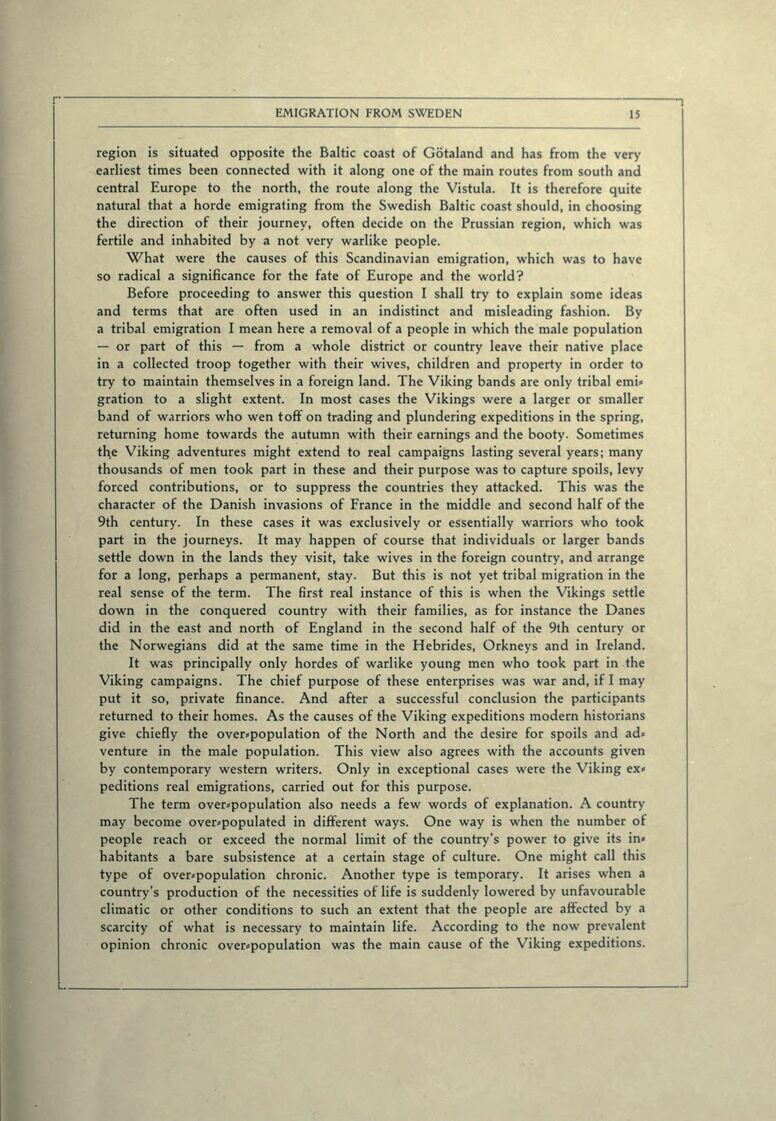
Full resolution (JPEG) - On this page / på denna sida - Part I - Professor Otto von Friesen, Uppsala, Emigration from Sweden in Ancient Times

<< prev. page << föreg. sida << >> nästa sida >> next page >>
Below is the raw OCR text
from the above scanned image.
Do you see an error? Proofread the page now!
Här nedan syns maskintolkade texten från faksimilbilden ovan.
Ser du något fel? Korrekturläs sidan nu!
This page has never been proofread. / Denna sida har aldrig korrekturlästs.
region is situated opposite the Baltic coast of Götaland and has from the very
earliest times been connected with it along one of the main routes from south and
central Europé to the north, the route along the Vistula. It is therefore quite
natural that a horde emigrating from the Swedish Baltic coast should, in choosing
the direction of their journey, often decide on the Prussian region, which was
fertile and inhabited by a not very warlike people.
What were the causes of this Scandinavian emigration, which was to have
so radical a significance for the fate of Europé and the world?
Before proceeding to answer this question I shall try to explain some ideas
and terms that are often used in an indistinct and misleading fashion. By
a tribal emigration I mean here a removal of a people in which the male population
— or part of this — from a whole district or country leave their native place
in a collected troop together with their wives, children and property in order to
try to maintain themselves in a foreign land. The Viking bands are only tribal emi*
gration to a slight extent. In most cases the Vikings were a larger or smaller
band of warriors who wen toff on trading and plundering expeditions in the spring,
returning home towards the autumn with their earnings and the booty. Sometimes
tl^e Viking adventures might extend to real campaigns lasting several years; many
thousands of men took part in these and their purpose was to capture spoils, levy
forced contributions, or to suppress the countries they attacked. This was the
character of the Danish invasions of France in the middle and second half of the
9th century. In these cases it was exclusively or essentially warriors who took
part in the journeys. It may happen of course that individuals or larger bands
settie down in the lands they visit, take wives in the foreign country, and arrange
for a long, perhaps a permanent, stay. But this is not yet tribal migration in the
real sense of the term. The first real instance of this is when the Vikings settie
down in the conquered country with their families, as for instance the Danes
did in the east and north of England in the second half of the 9th century or
the Norwegians did at the same time in the Hebrides, Orkneys and in Ireland.
It was principally only hordes of warlike young men who took part in the
Viking campaigns. The chief purpose of these enterprises was war and, if I may
put it so, private finance. And after a successful conclusion the participants
returned to their homes. As the causes of the Viking expeditions modern historians
give chiefly the over*population of the North and the desire for spoils and ad»
venture in the male population. This view also agrees with the accounts given
by contemporary western writers. Only in exceptional cases were the Viking ex*
peditions real emigrations, carried out for this purpose.
The term over*population also needs a few words of explanation. A country
may become over*populated in different ways. One way is when the number of
people reach or exceed the normal limit of the country’s power to give its in*
habitants a bare subsistence at a certain stage of culture. One might call this
type of over*population chronic. Another type is temporary. It arises when a
country’s production of the necessities of life is suddenly lowered by unfavourable
climatic or other conditions to such an extent that the people are affected by a
scarcity of what is necessary to maintain life. According to the now prevalent
opinion chronic over*population was the main cause of the Viking expeditions.
<< prev. page << föreg. sida << >> nästa sida >> next page >>